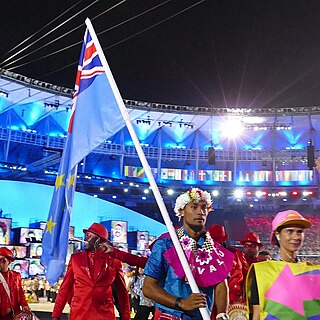Related Research Articles

Tuvalu, formerly known as the Ellice Islands, is an island country in the Polynesian subregion of Oceania in the Pacific Ocean, about midway between Hawaii and Australia. It lies east-northeast of the Santa Cruz Islands, northeast of Vanuatu, southeast of Nauru, south of Kiribati, west of Tokelau, northwest of Samoa and Wallis and Futuna, and north of Fiji.
The politics of Tuvalu takes place in a framework of a parliamentary representative democratic monarchy, whereby the Monarch is the head of state, represented by the Governor-General, while the Prime Minister is the head of government. Executive power is exercised by the government.
Several politico-constitutional arrangements use reserved political positions, especially when endeavoring to ensure the rights of women, minorities or other segments of society, or preserving a political balance of power. These arrangements can distort the democratic principle of one person - one vote in order to address special circumstances.

The prime minister of Tuvalu is the head of government of Tuvalu. According to Tuvalu's constitution, the prime minister must always be a member of the parliament and is elected by parliament in a secret ballot. Because there are no political parties in Tuvalu, any member of parliament can be nominated for the role.
Tuvalu elects a legislature on a national level. The Parliament of Tuvalu has 16 members, elected for a four-year term in 8 double-seat constituencies. Tuvalu is a de facto non-partisan democracy since it does not have political parties. The political system is based on personal alliances and loyalties derived from clan and family connections. It does tend to have both a distinct government and a distinct opposition. The 16 members of the current parliament are elected from eight two-seat constituencies via plurality block voting.

The Parliament of Tuvalu is the unicameral national legislature of Tuvalu. The place at which the parliament sits is called the Vaiaku maneapa. The maneapa on each island is an open meeting place where the chiefs and elders deliberate and make decisions.

Sir Kamuta Latasi is a political figure from the Pacific nation of Tuvalu from Funafuti atoll. He was elected to the Parliament of Tuvalu in 1992. Latasi served as the 4th prime minister, and foreign minister, from 1993 until 1996. He has served as the Speaker of parliament from 2006 to September 2010 and again from December 2010 to March 2014.

Apisai Ielemia was a Tuvaluan politician. He served as the tenth Prime Minister of Tuvalu from 2006 to 2010, and also held the role as Foreign Minister. He was returned as a member of parliament in the 2010 Tuvaluan general election. He was re-elected to parliament in the 2015 Tuvaluan general election. On 5 October 2016 Chief Justice Sweeney of the High Court of Tuvalu declared that Ielemia’s parliamentary seat was vacant as he was not qualified to be a member of parliament, as the consequence of the short time the opposition MP served time in jail following his conviction on 6 May 2016 in the Magistrate’s Court of charges of abuse of office during the final year of his term as prime minister. The abuse of office charges related to payments deposited into a National Bank of Tuvalu personal account. The 5 October 2016 decision of the Chief Justice was controversial as it appeared to contradict the June 2016 decision of Justice Norman Franzi of the High Court of Tuvalu that had quashed Ielemia’s conviction and acquitted him of the abuse of office charges. The appeal to the High Court held that the conviction was "manifestly unsafe," with the court quashing the 12-month jail term.
Naama Maheu Latasi, Lady Latasi, OBE was a political figure from the Pacific nation of Tuvalu. She stood for election in the constituency of Nanumea in 1989 and was elected to the Parliament of Tuvalu. Lady Latasi served as Minister of Health, Education and Community Services in the first Government of Prime Minister of Tuvalu Bikenibeu Paeniu. She was the first female member of parliament in Tuvaluan history. An amazing feat, that served to both pave the way for other aspiring female members of parliament today, but propelled the movement of gender equality. She served in Parliament from 1989 to 1997. Although she was not re-elected in the first 1993 general election but regained her seat in parliament in the second 1993 general election.

Kausea Natano is a politician who served as the Prime Minister of Tuvalu from 19 September 2019 to 26 February 2024. He represented Funafuti as a Member of Parliament. He was first elected in the 2002 Tuvaluan general election and served as an MP until he was unseated in the 2024 Tuvaluan general election.
Parliamentary elections were held in Tuvalu on 16 September 2010. Voters elected fifteen members of the Parliament to a four-year term. All candidates were independents, as there are no political parties in the country. Ten out of the fifteen incumbent members were re-elected. The remaining five incumbents, including Deputy Prime Minister Tavau Teii, did not retain their seats. The incumbent Prime Minister, Apisai Ielemia, retained his seat in Vaitupu constituency. On 29 September, Maatia Toafa from Nanumea won eight of the fifteen votes to become Prime Minister.

Sport is an important part of Tuvaluan culture, which sporting culture is based on traditional games and athletic activities and the adoption of some of the major international sports of the modern era.

Association football is the most popular sport in Tuvalu. Football in Tuvalu is governed by the Tuvalu National Football Association (TNFA). The TNFA became an associate member association of the Oceania Football Confederation (OFC) on 15 November 2006 with a further reinstatement on 16 March 2020. The TNFA has been wanting to become a full member of the OFC and a member of FIFA since 1987.
A by-election was held in the Nui constituency in Tuvalu on 24 August 2011. It was triggered by the death of the incumbent, MP Isaia Italeli, the Minister for Works, who died quite suddenly in late July while in Samoa on government business. Although there are no political parties in Tuvalu, Members of Parliament align themselves with the government or with the Opposition, and Italeli's death had resulted in Prime Minister Willy Telavi's government losing its one-seat majority in Parliament. The by-election was thus highly important to the government's survival.
Pelenike Tekinene Isaia served in the Parliament of Tuvalu from 2011 to 2015. Before her election as an MP she worked for the Tuvalu Cooperative Society, as its branch manager in Nui.
Tuvalu is a small island nation in the South Pacific, located North of Fiji and North West of Samoa. The population at the 2012 census was 10,837. Tuvalu has a written constitution which includes a statement of rights influenced by the United Nations Universal Declaration of Human Rights and the European Convention on Human Rights. While most human rights in Tuvalu are respected, areas of concern include women’s rights and freedom of belief, as well as diminishing access to human rights in the face of global warming. The latter has played a major role in the implementation of human rights actions in Tuvalu given its geographical vulnerability and scarce resources.

The Tuvalu A-Division for women is the top level women's football league in Tuvalu. The league is organized by the Tuvalu National Football Association.

Women in Tuvalu continue to maintain a traditional Polynesian culture within a predominantly Christian society. Tuvaluan cultural identity is sustained through an individual's connection to their home island. In the traditional community system in Tuvalu, each family has its own task, or salanga, to perform for the community. The skills of a family are passed on from parents to children. The women of Tuvalu participate in the traditional music of Tuvalu and in the creation of the art of Tuvalu including using cowrie and other shells in traditional handicrafts. There are opportunities of further education and paid employment with non-government organisations (NGOs) and government enterprises, education and health agencies being the primary opportunities for Tuvaluan women.

The Art of Tuvalu has traditionally been expressed in the design of clothing and traditional handicrafts such as the decoration of mats and fans. Tuvaluan clothing was traditionally made from Fala leaves.
References
- ↑ "Tuvalu women favour plan of reserved seats". RNZ . 17 May 2010. Retrieved 12 December 2020.